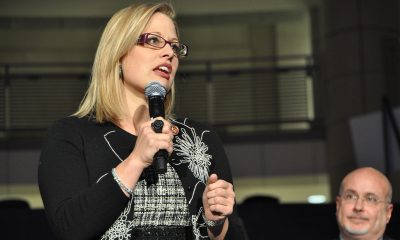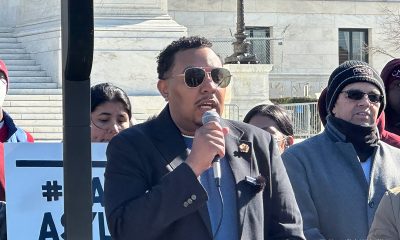News
LGBT Equality Caucus doubles its membership
Congressional group grows to 102
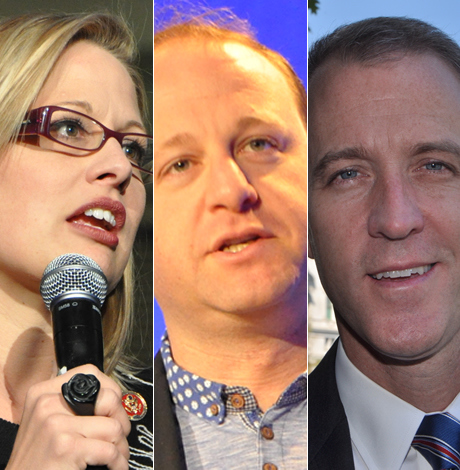
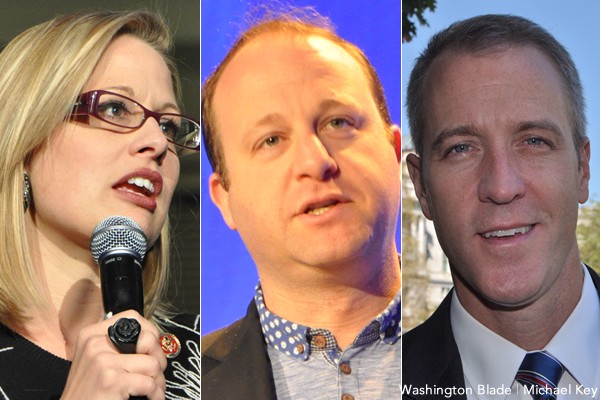
Co-chairs of the LGBT Caucus include Reps. Kyrsten Sinema (D-Ariz.), Jared Polis (D-Colo.) and Sean Patrick Maloney (D-N.Y.) (Washington Blade photos by Michael Key)
The congressional caucus dedicated to LGBT issues has nearly doubled its membership, rebounding after experiencing attrition in recent years as a result of shifting to dues-based membership.
The LGBT Equality Caucus announced on Tuesday it has started the 115th Congress with 102 members, which is nearly double the roster of 53 members at the start of the last Congress.
The caucus is co-chaired by each of the six openly LGBT members of Congress: Reps. Jared Polis (D-Colo.), David Cicilline (D-R.I.), Sean Patrick Maloney (D-N.Y.), Mark Pocan (D-Wis.), Kyrsten Sinema (D-Ariz.) and Mark Takano (D-Calif.).
“On behalf of the co-chairs, I thank my colleagues in both parties who have joined the LGBT Equality Caucus and pledged to stand for and with the LGBT community,” Sinema said in a statement. “While we’ve made significant process in recent years, we still have more work to do and must protect the progress we’ve made. Our caucus continues to work to ensure every American has the fundamental freedom and opportunity to pursue the American Dream.”
The number of members at the start of 2015 dropped precipitously from 113 in the previous Congress to 53 after the LGBT Equality Caucus instituted $400 in annual dues for members.
Dues payment for congressional caucuses isn’t unusual. The Congressional Progressive Caucus has a dues requirement for members.
The 11 vice chairs of the LGBT Equality Caucus are Reps. Ted Deutch (D-Fla.), Ruben Gallego (D-Ariz.), Joseph Kennedy III (D-Mass.), Dan Kildee (D-Mich.), Barbara Lee (D-Calif.), Ted Lieu (D-Calif.), Alan Lowenthal (D-Calif.), Jerrold Nadler (D-N.Y.), Mike Quigley (D-Ill.), Linda T. Sánchez (D-Calif.) and Adam Schiff (D-Calif.).
Among the 102 members of the LGBT Equality Caucus are two Republicans: Reps. Ileana-Ros-Lehtinen (R-Fla.) and Carlos Curbelo (R-Fla.). Both support marriage equality and are considered supporters of LGBT rights.
National
Target limits Pride Month collection sales
Attacks against employees, threats prompted company to remove LGBTQ products in 2023

The Minneapolis-based retail giant Target has announced that it has scaled back availability of its LGBTQ Pride Month collection to select stores and online sales. In May of last year the retailer was forced to remove its LGBTQ merchandise after attacks on employees and emailed threats including bomb threats.
In a media statement to the Washington Blade deflecting on specifics regarding the company’s decision to only offer its Pride collection to only about roughly half of its nearly 2,000 stores nationwide, a spokesperson for Target said:
“Target is committed to supporting the LGBTQIA+ community during Pride Month. Beyond our own teams, we will have a presence at local Pride events in Minneapolis and around the country, and we continue to support a number of LGBTQIA+ organizations. Additionally, we will offer a collection of products for Pride, including adult apparel, home products, food and beverage, which has been curated based on guest insights and consumer research. These items, starting at $3, will be available in select stores and on Target.com.”
In an emailed statement reacting to the news Human Rights Campaign President Kelley Robinson said:
“Pride merchandise means something. LGBTQ+ people are in every zip code in this country, and we aren’t going anywhere. With LGBTQ+ people making up 30 percent of Gen Z, companies need to understand that community members and allies want businesses that express full-hearted support for the community. That includes visible displays of allyship.
Target’s decision is disappointing and alienates LGBTQ+ individuals and allies at the risk of not only their bottom line but also their values.”
In May 2023, police departments in Utah, Ohio, and Pennsylvania aided by assistance from agents from Federal Bureau of Investigation Field Offices in Ohio and Utah investigated threats, including a bomb threat to multiple Utah locations, made by email to local media referencing the retail chain Target’s LGBTQ merchandise collections celebrating Pride Month.
At the time last May, Target spokesperson Kayla Castañeda released a statement from the company:
“For more than a decade, Target has offered an assortment of products aimed at celebrating Pride Month. Since introducing this year’s collection, we’ve experienced threats impacting our team members’ sense of safety, and well-being while at work. Given these volatile circumstances, we are making adjustments to our plans, including removing items that have been at the center of the most significant confrontational behavior. Our focus now is on moving forward with our continuing commitment to the LGBTQIA+ community and standing with them as we celebrate Pride Month and throughout the year.”
Canada
Prominent Ugandan activist asks for asylum in Canada
Steven Kabuye stabbed outside his home on Jan. 3

A prominent Ugandan activist who was stabbed outside his home earlier this year has asked for asylum in Canada.
Two men on motorcycles attacked Steven Kabuye, co-executive director of Coloured Voice Truth to LGBTQ Uganda, on Jan. 3 while he was going to work.
Kabuye posted a video to his X account that showed him on the ground writhing in pain with a deep laceration on his right forearm and a knife embedded in his stomach.
He spoke with the Washington Blade from Kenya on Jan. 8 while he was receiving treatment. Kabuye arrived in Canada on March 6.
Kabuye during an April 27 telephone interview with the Blade from Canada said Rainbow Railroad, a group that works with LGBTQ and intersex refugees, helped him “get away from the dangers that were awaiting me in Kenya and Uganda.” Kabuye said he asked for asylum in Canada because he “cannot return to either Uganda or Kenya.”
“The Ugandan government fails to get the culprits who wanted to end my life,” he said.
Kabuye told the Blade that Ugandan police officials threaten his colleagues when he publicly speaks about his case.
“Every time I come up and demand for the police to act out, they end up calling the colleagues of mine that remain in Uganda and intimidate them so they can scare me off, so they can make me pack up and keep quiet,” he said.
Ugandan President Yoweri Museveni last May signed his country’s Anti-Homosexuality Act that, among other things, contains a death penalty provision for “aggravated homosexuality.”
Canadian Foreign Minister Mélanie Joly described the law as a “blatant violation of human rights and fundamental freedoms of LGBTQ+ Ugandans.”
The U.S. has sanctioned Ugandan officials and removed the country from a duty-free trade program. The World Bank Group also suspended new loans to Uganda in response to the Anti-Homosexuality Act.
The Ugandan Constitutional Court last month refused to “nullify the Anti-Homosexuality Act in its totality.” A group of Ugandan LGBTQ activists have appealed the ruling.
“The previously concluded ruling did not make a difference,” said Kabuye.
Kabuye told the Blade he has an interview with Canadian immigration officials on Friday. He said he will continue to advocate on LGBTQ Ugandans from Canada.
“I’m very grateful to Rainbow Railroad,” said Kabuye. “They’ve still given me a chance to continue my advocacy.”
National
From LGBTQ book bans to internet bans: A bipartisan attack on knowledge
Online safe spaces for queer youth increasingly at risk
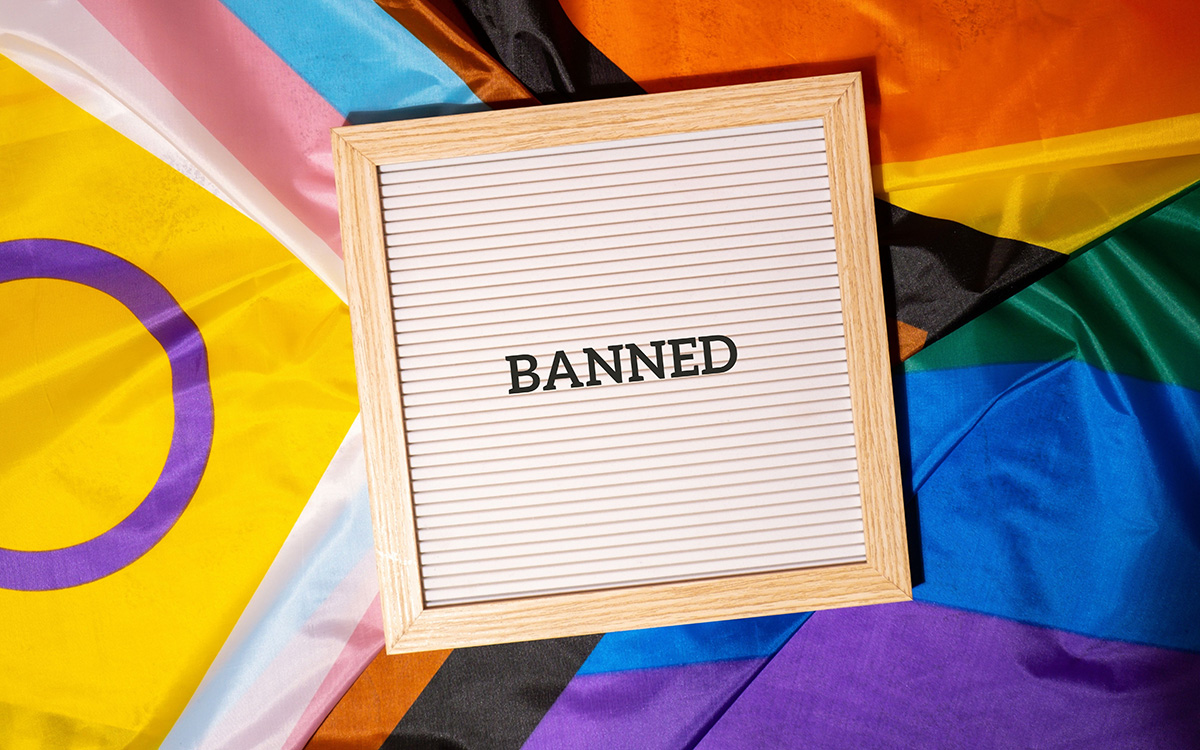
“They had LGBTQ-inclusive books in every single classroom and school library,” Maxx Fenning says of his high school experience. “They were even working on LGBTQ-specific course codes to get approved by the state,” he said, describing courses on queer studies and LGBTQ Black history.
No, Fenning didn’t grow up in Portland or a Boston suburb. Fenning graduated from a South Florida high school in 2020. Florida’s transformation from mostly affirming to “Don’t Say Gay” has been swift, he says. “It feels like a parallel universe.”
Fenning, who just graduated from the University of Florida, follows the developments closely as the executive director of PRISM FL Inc., a youth-led LGBTQ nonprofit he founded at 17. “I’ve watched so many of the things that I kind of took advantage of be stripped away from all of the students that came after me,” Fenning says. “It’s one thing to be in an environment that’s not supportive of you. It’s another thing to be in an environment that’s supportive of you and then watch it fall apart.”
“It’s just gut-wrenching,” Fenning explained, describing how Florida’s increasingly hostile legislation has transformed the state he has lived in most of his life.
Most recently, Florida passed HB3, “Online Protections for Minors,” which bans youth under 14 from having social media accounts. Youths aged 14 and 15 need parental consent before getting accounts and any minor must be protected from “harmful content” online.
Unlike the previous legislation, which came predominately from the right and directly targeted issues like gender-affirming healthcare or DEI, HB3 is part of a bipartisan push across the country to regulate social media, specifically for youth. HB3 was co-sponsored by Michele K. Rayner, the openly queer Black member of the Florida Legislature, alongside many of her colleagues across the aisle. Similar national legislation, like Kids Online Safety Act, includes 68 Democratic and Republican sponsors.
Shae Gardner, policy director at LGBT Tech, explains that this legislation disproportionately harms LGBTQ youth, regardless of intentions or sponsors.
Gardner says that while all these bills claim they are for the safety of kids, for LGBTQ youth, “you are putting them at risk if you keep them offline.” She explains that “a majority of LGBTQ youth do not have access to affirming spaces in their homes and their communities. They go online to look like that. A majority say online spaces are affirming.”
Research by the Trevor Project, which reports that more than 80% of LGBTQ youth “feel safe and understood in specific online spaces” backs this up. Specific online spaces that are under target from legislation, like TikTok, are disproportionately spaces where LGBTQ youth of color feel safest.
“For LGBTQ people, social media has provided spaces, which are, at once both public and private, that encourage, and enhance … a great deal of self-expression that is so important for these communities,” confirms Dr. Paromita Pain, professor, Global Media Studies & Cybersecurity at University of Nevada, Reno. She is the editor of the books “Global LGBTQ Activism” and “LGBTQ digital cultures.”
Fenning emphasizes that with bills like “Don’t Say Gay,” in Florida — and other states including North Carolina, Arkansas, Iowa, and Indiana — LGBTQ youth have less access to vital information about their health and history. “Social media [are] where young people increasingly turn to get information about their community, their history, their bodies and themselves.”
At PRISM, Fenning works to get accurate, fact-backed information to Florida youth through these pathways, ranging from information on health and wellbeing to LGBTQ history to current events. The feedback has been overwhelmingly positive. Often youth tell him “I wish I learned this in school,” which is a bittersweet feeling for Fenning since it represents how much young LGBTQ youth are missing out on in their education.
Morgan Mayfaire, executive director of TransSOCIAL, a Florida advocacy group, said that these internet bans are an extension of book bans, because when he was a teen, books were his pathway into the LGBTQ community. “For me it was the library and the bookstores that we knew were LGBTQ friendly.” Now 65, Mayfaire understands that “kids today have grown up with the internet. That’s where they get all their information. You start closing this off, and you’re basically boxing them in and closing every single avenue that they have. What do you think is going to happen? Of course, it’s going to have an impact emotionally and mentally.”
Fenning says that social media and the internet were powerful to him as a teen. “I was able to really come into my own and learn about myself also through social media. It was really powerful for me, building a sense of self.” Gardner agrees, sharing that legislation like this, which would have limited “15-year-old me, searching ‘if it was OK to be gay’ online, would have stagnated my journey into finding out who I was.”
Gardner also explains that many of the bills, like HB3, limit content that is “harmful” or “obscene” but do not specifically define what that content is. Those definitions can be used to limit LGBTQ content.
“Existing content moderation tools already over-censor LGBTQ+ content and users,” says Gardner, “they have a hard time distinguishing between sexual content and LGBTQ+ content.” Pain emphasizes that this is no accident, “there are algorithms that have been created to specifically keep these communities out.”
With the threat of fines and litigation from HB3, says Gardner, “moderation tools and the platforms that use them is only going to worsen,” especially since the same legislators may use the same terms to define other queer content like family-friendly drag performances.
In addition to being biased, it has devastating effects on LGBTQ youth understanding of their sense of identity, Fenning explains. “That perception of queer people as being overly sexual or their relationships and love being inherently sexual in a way that other relationships aren’t does harm to our community.”
Gardner acknowledges that online safety has a long way to go — pointing to online harassment, cybercrime, and data privacy—but that these bills are not the correct pathways. She emphasizes “everybody’s data could be better protected, and that should be happening on a federal level. First and foremost, that should be the floor of protection.”
She also emphasizes that content moderation has a long way to go from targeting the LGBTQ community to protecting it. “Trans users are the most harassed of any demographic across the board. That is the conversation I wish we were having, instead of just banning kids from being online in the first place.”
Being queer on the ground in Florida is scary. “The community is very fearful. This [legislation] has a big impact on us,” explains Mayfaire.
“I mean, it sucks. Right?” Fenning chuckles unhappily, “to be a queer person in Florida. In a state that feels like it is just continuously doing everything it can to destroy your life and all facets and then all realms.”
Despite the legislative steamrolling, several court wins and coordinated action by LGBTQ activists help residents see a brighter future. “There’s a weird tinge of hope that that has really been carrying so many queer people and I know myself especially this year as we’re seeing the rescinding of so many of these harmful policies and laws.”
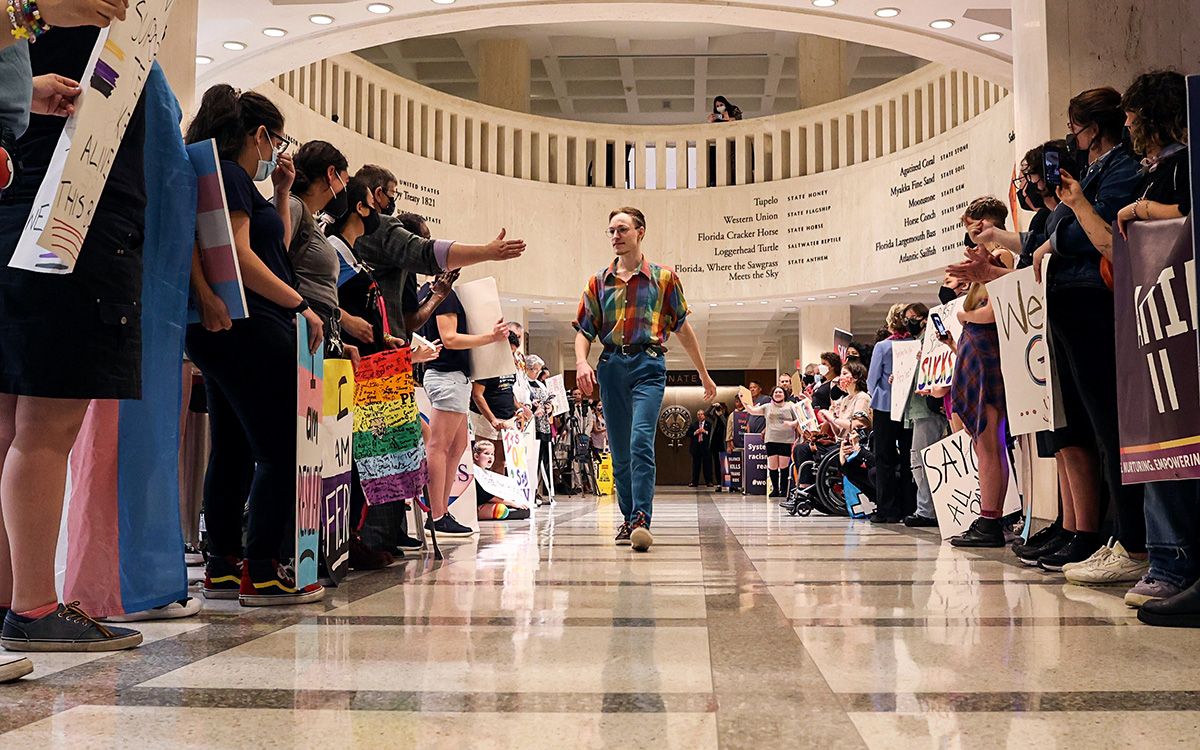
For example, this March, Florida settled a challenge to its “Don’t Say Gay” legislation that significantly lessens its impact. Already, experts warn that HB3 will face legal challenges.
Pain emphasizes that social media is central to LGBTQ activism, especially in Florida. “There have been examples of various movements, where social media has been used extremely effectively, to put across voices to highlight issues that they would not have otherwise had a chance to talk about,” she says, specifically citing counteraction to “Don’t Say Gay.” That is another reason why legislation like this disproportionately harms LGBTQ people and other minority groups, it limits their ability to organize.
Fenning emphasizes that HB3 directly attacks spaces like PRISM, which do not just share information for the LGBTQ community, but provide spaces for them. “Foundationally it provides an opportunity for the community,” he says, but more than anything, it provides a space, where “you can you can learn from your queer ancestors, so to speak, and take charge.” And that is invaluable.
(This story is part of the Digital Equity Local Voices Fellowship lab through News is Out. The lab initiative is made possible with support from Comcast NBCUniversal.)
-

 The White House2 days ago
The White House2 days agoEXCLUSIVE: White House Press Secretary Karine Jean-Pierre on speaking out and showing up
-

 Middle East2 days ago
Middle East2 days agoTel Aviv authorities cancel Pride parade
-
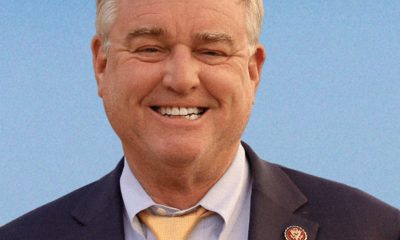
 Maryland4 days ago
Maryland4 days agoTrone discusses transgender niece
-

 The White House3 days ago
The White House3 days agoJane Rigby awarded Presidential Medal of Freedom

